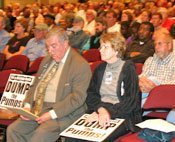Sept. 3, 2008
The Environmental Protection Agency followed through with predictions and announced yesterday its decision to kill the U.S. Army Corps of Engineers' proposed Yazoo Pumps Project in the Mississippi Delta.
Benjamin Grumbles, EPA assistant administrator for water, said the agency reached its decision under the dictates of the U.S. Clean Water Act, which safeguards public drinking water, shellfish beds and fishing areas.
The EPA spent more than five months vetting the $220 million flood control project, which has been sitting on the nation's "to-do" list since 1941 when the Japanese bombed Pearl Harbor.
Many environmentalists descended on Mississippi during recent EPA public opinion forums discussing the project, including an April forum in Vicksburg.
The EPA eventually joined environmentalists and national media outlets such as the New York Times editorial board in describing 67,000 acres of the Yazoo Backwater Area, which would feel the impacts of the massive draining program, as containing "some of the richest wetland and aquatic resources in the nation, and serves as critical fish and wildlife habitat." It concluded that, "the proposed project would result in unacceptable damage to these valuable resources that are used for wildlife, economic and recreational purposes."
Gov. Haley Barbour and Republican Sen. Thad Cochran approved the massive project. Barbour, addressing outcry from many environmentalists and out-of-state media, harangued critics for being outsiders who did not have the best interest of state residents in mind.
"The overwhelming majority of the negative comments received against the project are by individuals who do not live in the affected area, or even in Mississippi." Barbour wrote in a statement.
He did not mention that the brunt of the $220 million cost of he projectincluding an additional $2 million in annual operation costswould be carried by U.S. taxpayers outside the state.
Grumbles said in a statement that he was confident flood control could be reached through other means.
"We're helping to identify a better project that reduces flooding, protects the environment and saves taxpayer dollars," Grumbles said.
Barbour's office did not immediately return calls.



Comments
Use the comment form below to begin a discussion about this content.